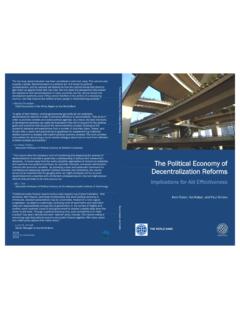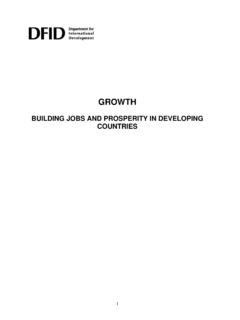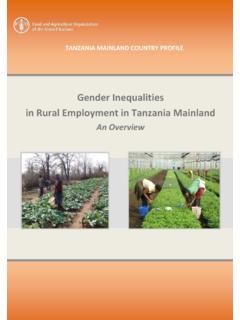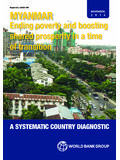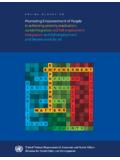Transcription of ASSESSING PRIVATE SECTOR CONTRIBUTIONS TO …
1 IFC JOBS STUDYASSESSING PRIVATE SECTOR CONTRIBUTIONS TO JOB CREATION and poverty REDUCTIONSUMMARY JANUARY 2013 Why jobs matterHigh levels of unemployment, especially among youth, and large numbers of low-quality jobs are problems in developing countries around the world, and therefore creating more and better jobs is an urgent priority. Jobs are much more than monetary income; they are the cornerstone of development. Jobs boost living stan-dards, raise productivity, and foster social cohesion, and they are the main path out of poverty . Currently 200 million people are unemployed globally, and the un-employment rate for youth is more than times higher than that of adults. By 2020, 600 million jobs must be created in developing countries mainly in Africa and Asia just to accommodate young people entering the workforce. In developing countries, the quality of jobs is just as important.
2 Almost a third of workers are poor, and about half particularly women are vulnerable, often working in informal jobs, which frequently provide fewer rights and protec-tions for workers. The PRIVATE SECTOR provides 9 out of 10 jobs in developing countries, and therefore plays a key role in creating the new jobs needed and fostering growth. It is crucial to understand the constraints that prevent the PRIVATE SECTOR from growing and generating jobs. Gov-ernments and development finance institutions must help build an environment where these constraints are minimized or the jobs are now in developing countriesThe PRIVATE SECTOR : pro-vides 9 out of 10 jobsSMEs: represent 66 percent of permanent, full-time employment. Share of employment by SECTOR : services increases the most, followed by manufacturing (the agricultural SECTOR shows a steady decline)Sources: World Bank (2012): World Development Report 2013; Aayagari, Demirguc-Kunt, and Maksimovic (2011); ILO (2012).
3 Global employment by the numbersNumber of unemployed: 200 millionUnemployment rate for youth: times higher than for adultsHighest unemployment rates: more than 10 percent in the Middle East and North Africa Number of jobs needed by 2020 to maintain cur-rent employment levels: 600 million Sources: World Bank (2012): World Development Report 2013; ILO (2012): Global Em-ployment Trends report is the result of an open-source study to assess the direct and indirect effects of PRIVATE SECTOR activity on job creation. The report examines how and under what conditions the PRIVATE SECTOR can best contribute to job creation and poverty reduction, drawing on a review of the literature and evaluations; surveys of more than 45,000 businesses in over 100 countries; a website, blog, and essay competition to solicit outside views; macro and micro case studies of IFC clients; and IFC s own operational experience and lessons learned.
4 The report aims to elicit practical lessons that can be applied to the work of IFC, policy- makers, and other financial institutions focused on the PRIVATE , as the Iargest global development institution focused on the PRIVATE SECTOR in developing countries, is well placed to lead this study. The study has been closely coordinated with the World Bank s World Development Report (WDR) 2013 on Jobs and draws upon the experience of relevant departments within the World Bank and IFC as well as the expertise of our external consultants, partners, and report was prepared by a team led by Roland Michelitsch under the overall guidance of Nigel Twose, director of IFC s Development Impact Department. The core team of authors included Gabriela Armenta, Ferran Casadevall-Massuet, Namita Datta, Anastasiya Denisova, Rijak Grover, Luz Leyva, Junko Oikawa, and Anqing Shi.
5 The report greatly benefited from the inputs of an external technical advisory panel, whose members were Arlete Georgete Jonass Patel Alves (CEO, Supermercados Ka da Terra), Ragui Assaad (University of Minnesota), Major Gen. (Retired) Amjad Khan Chowdhury (CEO, PRAN Group), Mary Hallward-Driemeier (World Bank), Rafael Lalive (University of Lausanne), Martin Rama (World Bank), and Raymond Torres (Interna-tional Labour Organization). Romina Bandura (ILO) and Kathleen Beegle (World Bank) also actively contributed to the panel s feedback. IFC and World Bank colleagues helped with several case studies and research that were conducted as part of the report. Ruchira Kumar, Hayat Abdulahi Abdo, and Oxana Miliaeva produced the micro case studies for the manufacturing and 2agribusiness sectors. Mahima Khanna and Govinda Timilsina participated in the micro case study for the infrastructure section.
6 Garima Sahai made possible the micro case study for access to finance. The consulting firm Steward Redqueen led the produc-tion of the macro case studies. Alla Khodakivska and Jean-Luc Park also produced background documentation relating to the financial SECTOR . Gloria Paniagua and Anastasiya Denisova produced the meta-evaluation, and Miriam Bruhn contributed as peer reviewer. Finally, Federica Saliola and Jon Vierk Bernt conducted the analysis of Enterprise Survey data. The report also includes the inputs of many operational colleagues in IFC and the World Bank, among them Alejandro Alvarez, Gokhan Akinci, M. Assaid Amlaiky, Belinda Amoah, Clive Armstrong, Victoria Bakhtina, John Barham, Najy Benhassine, Antoine Courcelle-Labrousse, Daniel Crabtree, Daniel Goldblum, Rapti Goonesekere, Douglas Grayson, Neil Gregory, Juliana Guaqueta Ospina, Pierre Guislain, William Haworth, Armando Heilbron, Richard Henry, Zenaida Hernandez Uriz, Syed Estem Dadul Islam, Sebastian James, Alan Johnson, Arthur Karlin, Mohammed Ali Khan, Mary-Jean Lindile Moyo, Liane Asta Lohde, Amy Luinstra, Syed Mahmood, Mouayed Makhlouf, Sumit Manchanda, Martha Martinez Licetti, Andrei Mikhnev, Melina Mirmulstein, Carmen Niethammer, Aminur Rahman, Sreekala Ramanathan, Thomas Rehermann, Carlos Roberto Griffin, Elsa Rodriguez Felipe, Adam Sack, Massimiliano Santini, Katherine Scaife Diaz, Warrick Smith, Mathieu Verhaeghe.
7 And Leanne production of the report was supported by Thoko Moyo, Gloria Orraca-Atayi and Katherine Hutt Scott, and the initial phase by Rupa team would like to acknowledge the generous support of the governments of the Netherlands (through its Ministry of Foreign Affairs), Switzerland (through the State Secretariat for Economic Affairs) and the United Kingdom (through its Depart-ment for International Development).The full version of this report and detailed version of all associated case studies can be found at from Jin-Yong Cai, IFC Executive Vice President and Chief Executive Officer600 million. The number is so large, it s almost incomprehensible. Yet that s how many new jobs the world needs by 2020 just to keep up with the globe s surging population. Getting there won t be easy. It will be impossible without the PRIVATE SECTOR .
8 Joblessness, especially among the poor, is a global crisis. And for IFC, the world s largest development institution focused exclusively on the PRIVATE SECTOR , it s a top priority. Most of the world s 200 million unemployed are women and young people living in developing countries. Without work, they can t care for themselves or their families. The result: poverty , and social and economic PRIVATE SECTOR , which provides nine out of 10 jobs in developing countries, offers the best solution to the challenge of unemployment. IFC can play a critical targeting the PRIVATE SECTOR , we complement the World Bank s work with governments. In fiscal year 2012, we invested more than $20 billion, including funds mobilized from other investors, and spent almost $200 million on more than 630 advisory projects in 105 countries. This investment and advice helps countries address factors that can be the most important obstacles to job growth: the investment climate, infrastructure, access to finance, and education and clients create jobs.
9 We know it because we ve actively tracked direct employment for the past seven years. But we also know that the impact of our work goes far beyond the jobs created directly by investment clients. In fact, those jobs are only a small portion of the employment generated by IFC s our client Orissa Cement in India, for example. A loan from IFC allowed it to set up a plant and expand its capacity, directly creating around 300 jobs in four years and indirectly creating 7,200 more. To get a better look at how IFC contributes to job creation we commissioned this study. Our team left no stone unturned as it examined how the PRIVATE SECTOR can best contribute to job creation and poverty reduction. It reviewed reams of literature, evaluated surveys of more than 45,000 businesses in over 100 countries, solicited outside views through a website, blog, and essay competition, con-ducted case studies of IFC clients, and sought to learn from our own operational experience.
10 The study focuses on practical lessons, and seeks to find out what types of activities are most likely to have the greatest impact on job creation, and how these activities affect different societal groups. It complements the World Bank s recent World Development Report on Jobs by offering practical lessons and recommendations to help the PRIVATE SECTOR create more high-quality Jobs Study provides useful insights into how IFC and the World Bank Group can further strength-en the employment-creation effects of our activities and contribute even more to improving the quality of those jobs. Much more work lies ahead. We will tackle it forcefully supporting our clients and helping policy makers gain new practical insights into the PRIVATE SECTOR s role creating jobs in developing needs in specific regionsThe nature of the jobs challenge varies by region, due to different demographic, institutional, and socio-economic factors.




